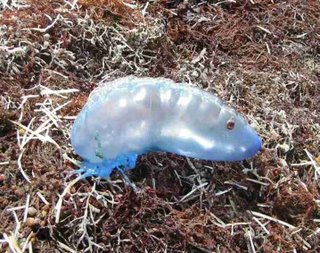 (Portuguese Man O' War washed ashore at Brazos Island State Park)
(Portuguese Man O' War washed ashore at Brazos Island State Park)Brazos Island State Park, also called Boca Chica State Park, is located about 6 miles (9.7 km) from Port Isabel as the crow flies. However, to arrive there by car you must go the long way by taking Highway 48 into Brownsville and then taking Highway 4 (Boca Chica Boulevard) back the same direction. Both ways are roughly 23 miles (37 km).
Highway 48 runs along the Brownsville Ship Channel, a 17-mile (27.4 km) waterway that runs from Brazos Santiago Pass to the Port of Brownsville, which opened in 1936. Along Highway 4, about 12 miles (19.3 km) from Brownsville, is a historical marker commemorating the Battle of Palmito Ranch, a Civil War battle that occurred 34 days after Lee surrendered at Appomattox. Apparently, news traveled slow in those days, which was unfortunate for the casualties of this pointless battle. The historical marker is about all there is to see, so it's a brief stop.
Further along, we passed a border patrol checkpoint on the opposite side of the road. On our way back we got to answer the usual "are you U.S. citizens" kinds of questions.
You know you've reached the park when Highway 4 turns into sand (keep driving and you go into the ocean). This area is sparsely developed and the beach has no facilities. I don't even remember seeing any portable toilets. If you are trying to get away from it all, this is the place to go.
If you take a right and go south you'll eventually reach the mouth of the Rio Grande. Located on both sides of the river once stood two towns that thrived during the Civil War, Clarksville on the U.S. side and Bagdad in Mexico. With a Union blockade in effect, the Confederacy managed to export their cotton by transporting it to Bagdad. The Union could not interfere with the trade once it was on the Mexican side of the border.
The shipping of cotton from Clarksville to Bagdad ended in 1863 when Union forces captured the area. Afterwards, cotton still made its way to Bagdad, but its transport originated further west along the river. Clarksville declined after this, and at the end of the Civil War, Bagdad followed. In 1867, a hurricane destroyed both towns.
Waking along the shore of Boca Chica beach we spotted several of these small blue, balloon-like objects. I had no idea what they were. Later, I found out they were the bodies of Portuguese man-of-war that had washed ashore. I was thankful I didn't touch one because even dead they can give a painful sting.
Highway 48 runs along the Brownsville Ship Channel, a 17-mile (27.4 km) waterway that runs from Brazos Santiago Pass to the Port of Brownsville, which opened in 1936. Along Highway 4, about 12 miles (19.3 km) from Brownsville, is a historical marker commemorating the Battle of Palmito Ranch, a Civil War battle that occurred 34 days after Lee surrendered at Appomattox. Apparently, news traveled slow in those days, which was unfortunate for the casualties of this pointless battle. The historical marker is about all there is to see, so it's a brief stop.
Further along, we passed a border patrol checkpoint on the opposite side of the road. On our way back we got to answer the usual "are you U.S. citizens" kinds of questions.
You know you've reached the park when Highway 4 turns into sand (keep driving and you go into the ocean). This area is sparsely developed and the beach has no facilities. I don't even remember seeing any portable toilets. If you are trying to get away from it all, this is the place to go.
If you take a right and go south you'll eventually reach the mouth of the Rio Grande. Located on both sides of the river once stood two towns that thrived during the Civil War, Clarksville on the U.S. side and Bagdad in Mexico. With a Union blockade in effect, the Confederacy managed to export their cotton by transporting it to Bagdad. The Union could not interfere with the trade once it was on the Mexican side of the border.
The shipping of cotton from Clarksville to Bagdad ended in 1863 when Union forces captured the area. Afterwards, cotton still made its way to Bagdad, but its transport originated further west along the river. Clarksville declined after this, and at the end of the Civil War, Bagdad followed. In 1867, a hurricane destroyed both towns.
Waking along the shore of Boca Chica beach we spotted several of these small blue, balloon-like objects. I had no idea what they were. Later, I found out they were the bodies of Portuguese man-of-war that had washed ashore. I was thankful I didn't touch one because even dead they can give a painful sting.

No comments:
Post a Comment